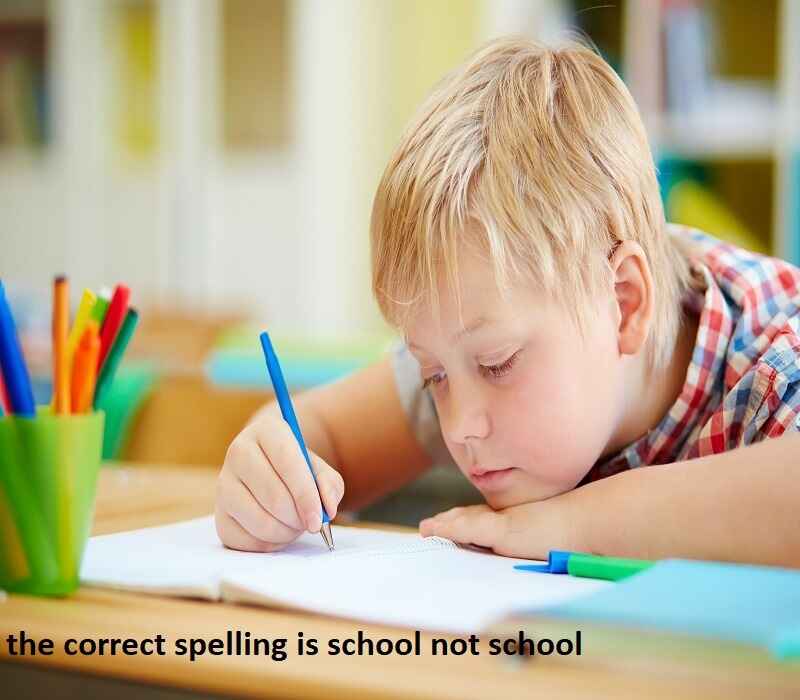Introduction
Spelling plays a crucial role in effective communication in our daily lives. The phrase “the correct spelling is school, not school. some pe—tymoff” highlights a common issue many encounter: the importance of spelling accuracy. This article will explore the significance of correct spelling, the implications of misspellings, and practical tips to enhance your spelling skills.
The Importance of Correct Spelling
Spelling is not just about following rules; it’s fundamental to clear communication. Correct spelling ensures that your message is understood without confusion. When we misspell simple words like “school,” it can lead to misunderstandings. For instance, misspelling “school” as “scool” might confuse readers, detracting from your intended message.
Moreover, accurate spelling reflects your attention to detail and professionalism. In academic and professional environments, spelling correctly is often seen as a sign of competence. If your written work is filled with spelling errors, it may undermine your credibility and authority.
Key Points:
- Correct spelling ensures clarity.
- It reflects professionalism and attention to detail.
- Misspellings can confuse and mislead.
Understanding the Phrase “The Correct Spelling is School, Not School”
At first glance, the phrase “the correct spelling is school, not school. some pe – tymoff” may seem humorous. However, it serves as a reminder of how even common words can be misspelled. The phrase emphasizes the necessity of correct spelling, encouraging us to pay closer attention to the words we often take for granted.
- “The correct spelling is school, not school” stresses the importance of spelling “school” accurately.
- “Some pe – tymoff” playfully highlights how errors can lead to nonsensical phrases.
For example, a student might write, “I go to scool every day.” This simple error could lead teachers to question their grasp of basic vocabulary. Thus, understanding the importance of spelling helps us communicate more effectively.
Common Misspellings of “School”
Despite its simplicity, “school“ is frequently misspelled. Below are some typical errors that individuals often encounter when spelling.
- Scool: A phonetic misinterpretation of the word.
- Shcool: A confusion with the “ch“ sound.
- Skool: A casual or slang variation often seen in social media.
These misspellings can occur for various reasons, including:
- Typographical errors: Hitting the wrong keys when typing.
- Phonetic confusion: Mishearing or misunderstanding the word’s pronunciation.
- Auto-correct issues: Technology sometimes suggests incorrect spellings.
Example: A teacher might find a paper that reads, “I love my skool.” While this is an innocent mistake, it detracts from the overall quality of the work.
Tips for Improving Spelling Skills
Improving your spelling skills is a gradual process. Here are some effective strategies:
Practice Regularly:
Frequent writing and reading reinforce correct spelling. Make it a habit to write daily, even if it’s just a journal entry.
Use Mnemonics:
Create memory aids to help remember tricky spellings. For example, think of “school” as “the place where cool kids learn.”
Read Extensively:
Reading books, articles, and essays exposes you to correctly spelled words in context, which helps you recognize proper spelling patterns.
Employ Technology:
Use spell-check tools wisely. While they can catch many errors, constantly review their suggestions to ensure accuracy.
Engage in Spelling Exercises:
Participate in spelling games and quizzes. Various platforms and applications provide dynamic and engaging methods for honing your spelling skills.
The Role of Technology in Spelling
In today’s digital age, technology significantly impacts our spelling practices. Spell checkers and autocorrect features are helpful but can also create dependence.
- While these tools identify many mistakes, they are not foolproof. Relying solely on them may hinder the development of independent spelling skills.
For instance, if someone types “scool” and their device autocorrects it to “school,” they might not learn from their mistake. Therefore, it’s essential to understand the correct spelling and not solely rely on technology.
Conclusion
The phrase “the correct spelling is school, not school. some pe – tymoff” reminds us of the importance of spelling accuracy in our lives. Correct spelling enhances communication and reflects our attention to detail and professionalism. Anyone can improve their spelling skills by practicing regularly and utilizing the tips provided.
Visit our Website to read more information. Get Instant Live
Frequently Asked Questions
1. What are some common spelling mistakes people make?
Common spelling mistakes often arise from phonetic confusion, double letters, and the inconsistency of vowel sounds. For example, many people misspell “definitely” as “definitely,” confusing it with how it’s pronounced. Other frequent errors include “accommodate,” often written as “accommodate,” where the double letters confuse.
2. How can I improve my spelling skills?
To improve your spelling skills, consider these effective strategies:
- Practice regularly: Frequent writing reinforces correct spelling.
- Use mnemonic devices: Create rhymes or phrases to remember tricky words.
- Read widely: Exposure to correctly spelled words enhances recognition.
- Keep a list of common mistakes: Regularly review and practice these words.
3. What are the most frequently misspelled words in English?
Some words often trip people up in spelling:
- “Accommodate”: Often misspelled as “acommodate.”
- “Definitely”: Commonly misspelled as “definately.”
- “Privilege”: Frequently misspelled as “priviledge.”
- “Separate”: Often confused as “seperate.”
- “Pronunciation”: Incorrectly spelled as “pronounciation.”
4. Are there any tools to help with spelling corrections?
Yes, several tools can assist with spelling corrections:
- Spell checkers: Integrated into most word processing software.
- Grammar checkers: Tools like Grammarly catch spelling errors and offer context-based suggestions.
- Mobile apps: Many spelling and grammar apps provide exercises and instant feedback
5. What are some tips for remembering correct spellings?
Here are some tips to help you remember correct spellings:
- Mnemonics: Use memory aids or creative phrases to help retain tricky spellings.
- Phonetic pronunciation: Say the word out loud, breaking it into syllables to catch silent letters.
- Frequent practice: Regular writing and reading improve familiarity with correct spellings

